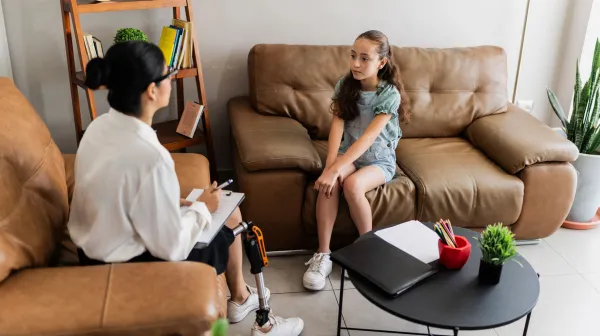Psychology
Outpatient Services
The Clinical Pediatric outpatient services are usually conducted within the Psychology Service at Texas Children’s Hospital, on the 16th floor of the Wallace Tower, 6701 Fannin Street, Houston, TX 77030. Sometimes, our providers will meet you at your other outpatient medical appointments within the Wallace Tower.
OCD and Anxiety Disorders Program
The OCD and Anxiety Disorders Program (OC-ADP) serves outpatient children and adolescents whose primary presentation involves an anxiety disorder. The various diagnostic presentations seen for assessment and treatment within the program include Obsessive Compulsive Disorder, Social Phobia, Specific Phobias, Separation Anxiety, Selective Mutism, Panic Disorder, and Health Anxiety. In addition, patients may have comorbid medical diagnoses that are treated by the pediatric medical specialists at Texas Children’s Hospital. The OC-ADP treatment approach is strongly evidence-based, with most interventions using exposure-based Cognitive-Behavior Therapy (CBT). Interventions are either individual-focused with significant family involvement or conducted via a family-based approach. Treatment is targeted to the specific anxiety symptoms and the number of sessions will be determined by presenting problems and progress in resolving those problems.
Brief Behavioral Intervention (BBI)
The Brief Behavioral Intervention (BBI) provides short-term outpatient treatment for parents and children eighteen months through age six with behavioral and/or developmental concerns, including temper tantrums, aggression (biting, hitting, spitting), defiance, toileting difficulties, sleep problems, school expulsion, etc. The number of sessions will be determined by the presenting problems and progress in resolving those problems, although treatment is usually brief (6-8 visits). The treatment approach is evidence based and involves behavioral parent training. Parents and teachers will be asked to complete behavioral measures (questionnaires about your child’s behavior) to track improvement.
General Diagnostic Intake Program
The General Diagnostic Intake Program provides assessment of mental health concerns resulting in diagnosis (as appropriate) and treatment recommendations. We specialize in diagnostic intakes for both chronically or acutely ill children, preschoolers with disruptive behavior, and children suspected to have or already diagnosed with anxiety disorders such as Social Phobia, Selective Mutism, Obsessive Compulsive Disorder (OCD), Separation Anxiety, Panic, Phobias, and Health Anxiety.
With the use of Texas Children's Hospital-certified translators, psychologists are able to work with families who speak languages other than English.
Pediatric Health and Behavior (PHAB) Consultation Program
The Pediatric Health and Behavior (PHAB) Consultation Program provides comprehensive psychological evaluations to children, teenagers, and often young adults who are actively followed by a medical specialist at Texas Children’s Hospital for a significant medical condition. We work closely with referring physicians and other medical staff, and are integrated into many different multidisciplinary clinics and services throughout the hospital. Common medical conditions seen through this program include: diabetes, childhood cancers (e.g., leukemia, brain tumors), bone marrow transplant, headache, surgery, concussion, and many others.
During the hour-long appointment, a psychologist will ask you and your child questions to understand any concerns you may have. At the conclusion of the appointment, the psychologist will provide your family with recommendations for a plan of care which could include referrals for receiving further evaluation or therapy services. These referrals may be placed for services at Texas Children’s Hospital or community providers, depending on a variety of factors. For community referrals, families will meet with our clinic’s social worker, Ms. Ledra Johnson, MSW, to receive more detailed resources based on the psychologist’s recommendation.
With the use of Texas Children's Hospital-certified translators, psychologists are able to work with families who speak languages other than English.
- For Parents/Guardians: Request an evaluation
Pediatric Psychology Outpatient Follow-up Program
Pediatric psychology outpatient follow up program is conducted by members of our team, both on our Psychology floor and in specialty outpatient clinics. All of our clinicians are committed to using evidence-based treatments, which means that the interventions are well-researched and shown to be effective. Therapy is collaborative in nature; we work with a patient and their family to determine appropriate goals and treatment plans. Therefore, each therapy session is custom tailored to address the family’s goal. Often, this involves the psychologist working with you and your child to improve adjustment related to having a chronic illness, effectively manage the demands of medical treatment (such as taking medication), or successfully transition back to school after an illness related absence. Because our team is able to also see inpatients admitted to Texas Children's Hospital, follow-up care at times may be done on both an inpatient and outpatient basis. We treat toddlers through young adults with acute or chronic illness or injury for pediatric psychology outpatient care.
Mobile Behavioral Health Unit
The MBHU focuses on increasing access to behavioral health care for youth and families who experience systemic barriers to accessing care in traditional settings. The current MBHU partners with several public schools that have high numbers of students from low-income and marginalized second-generation and newly immigrated families. Many of these youth have experienced devastating traumas (e.g., verbal, physical and sexual abuse, sex trafficking and exposure to torture or severe domestic violence) and personal losses (e.g., death of close family members or friends from suicide, domestic or gun violence). Our bilingual clinicians provide high quality, individualized, and evidence-based therapeutic screening, assessment and psychological treatment focused on trauma, anxiety, depression, and grief.
Explore more

